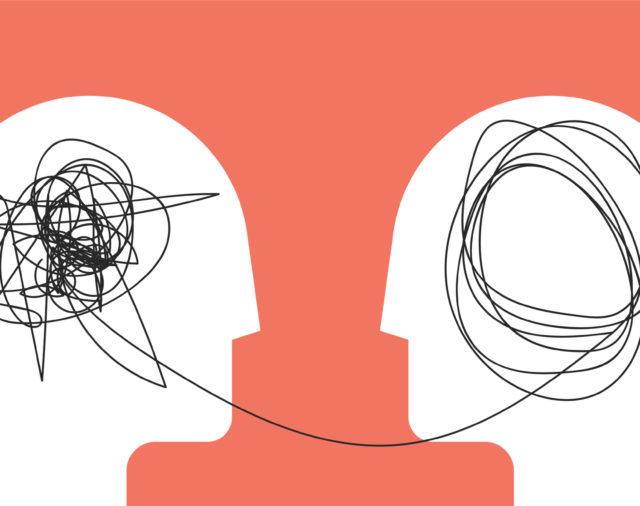One of the foremost examples of human kindness from the past 50 years is children’s TV host Mr. Rogers. On Mister Rogers’ Neighborhood, he taught an entire generation the value of goodness, virtuosity, and empathy. Perhaps his own empathy was displayed most clearly in his unlikely friendship with journalist Tom Junod. In 1998, Junod was assigned to write a profile of Mr. Rogers for the magazine Esquire. Junod was a controversial journalist who many people would refuse to work with and was himself wary of the interview. However, when all was said and all was done, Junod claimed that the process of interviewing Mr. Rogers entirely changed his outlook on life.
How? Empathy. Mr. Rogers was able to move outside of himself and relate to someone entirely different from him. He put himself in the shoes of Junod and tried different ways of connecting with him. The now famous Esquire profile and their subsequent friendship is the basis of the 2019 movie A Beautiful Day in the Neighborhood.
I believe one of the most important qualities we can have as leaders is empathy– the ability to reach outside oneself and recognize, understand, and share the thoughts and feelings of another person in the workplace, at home, and in the world. Especially in this time, when the world seems to be increasingly polarized, we must look outside ourselves and attempt to understand and connect with those around us.
One way to begin the process of becoming more empathetic is to consider your Empathy Quotient (E.Q.). Just as with your I.Q., this can be measured by answering a series of questions. This short quiz from PsychologyToday.com can be a great jumping off point. It asks you to consider your answer to questions such as “Are you sensitive to others, care about them, and want to help?,” “Can you hold space for others to express their people’s emotions?,” and “Are you intuitive and sensitive to other’s needs?”
No matter your score on the quiz, you can always work on improving your E.Q.
The first thing to consider when trying to become a more empathetic person is to evaluate how you feel about yourself. Think about your attitude towards your looks, your circumstances, and your overall feelings. I like to remember the Golden Rule “do to others what you would have them do to you,” because it serves as a reminder that we must be kind to ourselves in order to be kind to others. Practicing empathy with yourself is a great foundation for practicing empathy with others.
How do you do that for yourself?
- Practice mindfulness around areas where you feel self judgement. If you know you tend to be overly critical of the way you look, be mindful of that fact. Process these feelings and figure out how to practice a better internal dialogue regarding them.
- Allow yourself grace. None of us can be 100% perfect 100% of the time. Messing something up from time to time is a part of living. When it happens to you, allow yourself the freedom to let it go and move on.
- Stop comparing yourself to others. The old adage is true– “comparison is the thief of joy.” More often than not, comparison only breeds judgement and negative thoughts. In the age of social media, this is especially hard, but you must keep in mind that social media is not an accurate representation of reality.
Once we become more empathetic to ourselves, we can ask the question “how do you become empathetic towards others?”
- The first step is simply just observing and listening to the needs and opinions of others. Be attentive to others over yourself.
- Similar to allowing grace for yourself, you must allow grace for others by not immediately judging them. Everyone comes from different circumstances. Consider this before jumping to judgment.
- Create a narrative where you put yourself in the shoes of someone else. To quote author Tim Kreider “We don’t give other people credit for the same interior complexity we take for granted in ourselves.” We can recognize our own intricate mixture of emotions, but often over simplify the same thing in others. Instead, really try to imagine others complexly and understand where they are coming from instead of making an immediate judgement.
Henry David Thoreau once asked “Could a greater miracle take place than for us to look through each other’s eyes for an instant?” I believe that this call for empathy is the foundation for intimacy, connection, and long-lasting relationships. My invitation to you today is to look through someone else’s eyes and in doing so, become more intentional about pursuing authentic relationships through empathy. Can you do it? I believe you can!
Yasser Youssef is the president of The Budd Group, one of the leading facility service companies in the country, a North Carolina-based company that provides facility support services in the Southeast. Throughout his career, Youssef has met leaders from all backgrounds, and believes leadership is for everyone. Over the past few years, he has developed an affinity for writing and contributing thought leadership, and is often asked to speak to businesses throughout the country about authentic leadership.
Want to continue the conversation? Subscribe to Yasser Youssef’s blog or contact him to talk about speaking engagements.
